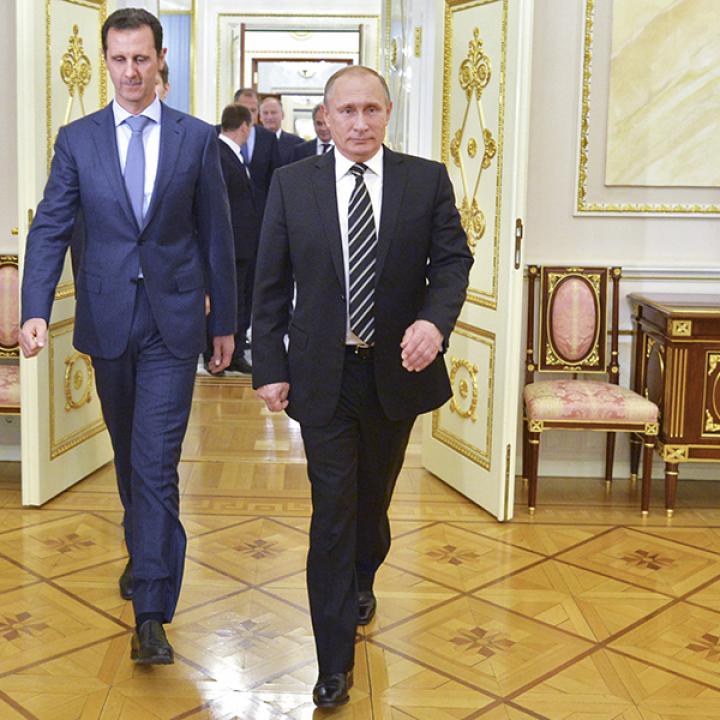
- Policy Analysis
- Articles & Op-Eds
Success in Syria Depends on Influence in Moscow

Establishing a safe haven in Syria could press Putin to fight ISIS in earnest, and convince him that protecting Assad will only prolong the war.
Galvanised by the attacks on Paris, politicians across the west are focused on how to tackle ISIS with bombs and boots on the ground. With the perception of victory central to the militants' claim to a divine mandate, it is vital to impose territorial losses. But that is not sufficient -- we must discredit the group itself. This is something America and Europe cannot do: only Sunni Muslims can do it. Enabling ISIS to present the western response as a war on Sunnis -- alienating them altogether -- would hand the jihadis a further propaganda victory.
Opting to treat Syrian President Bashar al-Assad as an ally would ensure we lose whatever Sunni support we have. Teaming up with a leader backed by Iran, the region's Shia powerhouse -- and who has killed thousands of Sunni opponents -- would imply that we are part of an onslaught against Sunnis.
The effect will be worse if we intensify strikes on ISIS even as the Russians target the non-ISIS opposition in Syria. Not only will Turkey, Saudi Arabia, Jordan, the United Arab Emirates and Sunni tribes distance themselves, but ISIS will present itself as the only group fighting for Sunnis. We must prevent this.
We must also influence Moscow's approach to Syria. President Vladimir Putin needs to join the fight against ISIS in earnest. He also needs to understand that continuing to protect the Assad regime as part of the Vienna diplomatic process convened by Russia and America, aimed at creating a post-Assad transition, will yield nothing except an extension of the war.
Moscow continues to bomb non-ISIS groups even after Mr Putin acknowledged that a bomb blew up a Russian airliner over the Sinai Peninsula in October and vowed revenge against ISIS. Meanwhile, the Russian aircraft Turkey shot down last month was bombing non-ISIS Turkmen along the border. If we want Mr Putin to focus exclusively on ISIS and adopt an approach that gives the Vienna process a chance to succeed, we need to think in terms of leverage rather than persuasion alone.
While he wants to show that Turkey will pay a price for the shooting down, Mr Putin is certain to be aware of the risks of an escalation in Syria. Now may be the time to convey discreetly to him that if Russia does not enforce a ceasefire on the Syrians and Iranians, the US will have no choice but to help create a safe haven. Mr Putin has little interest in shoring up the Syrian opposition -- and he knows a safe haven on the Turkish-Syrian border will enable anti-Assad forces to grow increasingly unified, meaning the costs of propping up the regime will rise and his own ability to be the arbiter of the Syrian future will fall.
But a safe haven would respond to the European need to stanch the refugee flow, and to the Turkish, Saudi, Emirati and Qatari interest in stopping the toll being inflicted on Syrian Sunnis. US allies could take on appropriate roles: European air forces helping enforce the no-fly area; Turkish forces providing protection on the ground; Gulf Arab states funding the infrastructure.
President Barack Obama has resisted the idea of a safe haven. But if he wants a ceasefire to produce the "big transition for Syria" that John Kerry, US secretary of state, believes it will, Russia must do what only it can: impose it on Mr Assad and the Iranians. With Sergei Lavrov, Russian foreign minister, declaring Moscow will co-operate on ISIS only if we "respect the sovereignty and the prerogatives of the Syrian government", no one should take that as a certainty.
Given that our options will narrow in the absence of a ceasefire, Mr Obama must find a way to exercise leverage in Syria -- and be willing to threaten, and if need be to take, a step he has resisted until now.
Dennis Ross is the counselor and William Davidson Distinguished Fellow at The Washington Institute.
Financial Times



